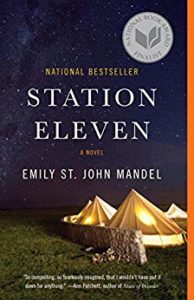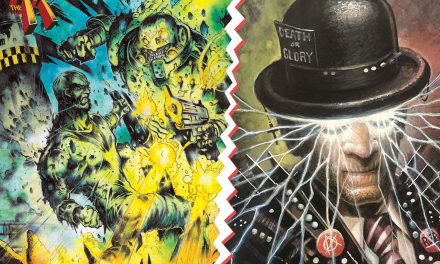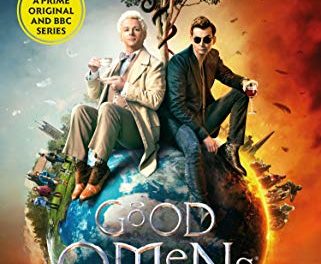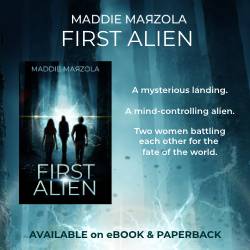 What would you miss most if it were no longer there? Navigating bringing up children, work and pleasure in an overcrowded and noisy, sprawling metropolis, feeling burnt out, tired, and often confused, it is a question I have often pondered in life. As someone whose childhood years were free of much of the technology we use today, I would have thought I would not miss them at all. There are so many literary and cinematic visions of a futuristic built-up urban society populated by screens, machines and robotic voices, people living in poverty, cramped and separated yet surrounded by a technology designed to numb us into escapism, more technological advances feel as though they would be a nightmare. In contrast, and like a breath of fresh air, Emily St John Mandel’s vision of a post-apocalyptic future is almost a utopia. The population has significantly decreased, nature is reclaiming the concrete jungles and urban sprawls of the early 21st century and life is simple, stripped back to the necessities of survival. A life I think many of us dream of – yet after reading this exquisite novel, the saying ‘be careful of what you dream of’ comes to mind.
What would you miss most if it were no longer there? Navigating bringing up children, work and pleasure in an overcrowded and noisy, sprawling metropolis, feeling burnt out, tired, and often confused, it is a question I have often pondered in life. As someone whose childhood years were free of much of the technology we use today, I would have thought I would not miss them at all. There are so many literary and cinematic visions of a futuristic built-up urban society populated by screens, machines and robotic voices, people living in poverty, cramped and separated yet surrounded by a technology designed to numb us into escapism, more technological advances feel as though they would be a nightmare. In contrast, and like a breath of fresh air, Emily St John Mandel’s vision of a post-apocalyptic future is almost a utopia. The population has significantly decreased, nature is reclaiming the concrete jungles and urban sprawls of the early 21st century and life is simple, stripped back to the necessities of survival. A life I think many of us dream of – yet after reading this exquisite novel, the saying ‘be careful of what you dream of’ comes to mind.
Station Eleven is a beautiful and yet haunting tale set 20 years on from a devastating event which wipes out most of civilisation. One snowy night in Toronto a famous actor, Arthur Leander dies on stage whilst performing the role of a lifetime. Kirsten, a child actor sits watching him die. That same evening a deadly virus touches down in North America with disastrous effects. Twenty years on and Kirsten is part of a travelling symphony whose nomadic lifestyle takes them through the wilderness into various settlements that have grown up since the collapse. The survivors of a past no one wants to talk about.
There are hints at the immediate after-effects of the virus but the author decides not to give us this hell – the knife tattoos worn by those who have had to kill say enough. Instead, she beautifully constructs a story which weaves together the past and present in a somewhat melancholy way. Ghosts haunt the entire story. We, the readers, become intimate confidants, observing the dreams, hopes, questions, regrets, the ‘what was and what could have been’s’ of the various characters. We witness a dead actor’s unhappy musings of his life through unanswered (and possibly unread) letters to a childhood friend; an artists and wife’s thoughts poured into a comic book crafted over a lifetime and then cherished and preserved by its reader; a man’s search for meaning through various professions; the exploration of empty houses, untouched and full of the past; and an aeroplane from which the passengers never disembarked. All part of the new lives being built by those who survived and those born into a landscape with hints of what had gone before. Echoes of the past are everywhere.
Undoubtedly the first few years after the collapse were hard yet it is the stories of those who survived which brings up the question of what bits of the past should be preserved? Art, storytelling, music? Or I Phones, computers, high heel shoes? Objects of wonder to those who never experienced them. The story follows the travelling symphony, a group of musicians and performers who travel through settlements, entertaining their inhabitants by performing Shakspeare. The slogan ‘Because Survival is Insufficient’ is written across the side of their wagon. Taken from a Star Trek film, merging the popular culture of the past with one of the philosophical questions we all ask ourselves at some point in life – what’s it all about? What’s the meaning of our existence?
Thought-provoking, melancholy, beautiful, sad, haunting and wondrous it is by far one of the best books I have read in some time. The book touched me deeply and has stayed with me months after reading. As I lie under the trees, the warm May sunshine making me feel sleepy, the soft sound of wind rustling the leaves – I always thought that my biggest fear would be not being able to stand in a field and feel the sun on my face, walk barefoot through a stream, swim in the ocean, experience the silence in a forest. But maybe if everything else was gone, all the things I take for granted in the 21st century, maybe I would be surprised by what I missed after all.
Review by Vicky Price
Purchase on:
eBook
Amazon US | Amazon UK | Kobo
Paperback:
Amazon | Barnes & Noble | Waterstones |






